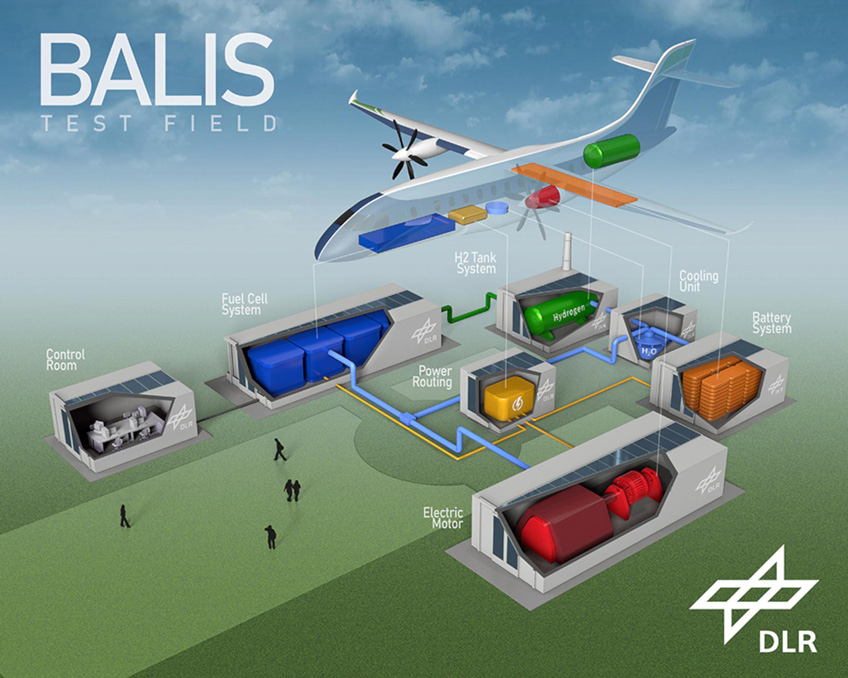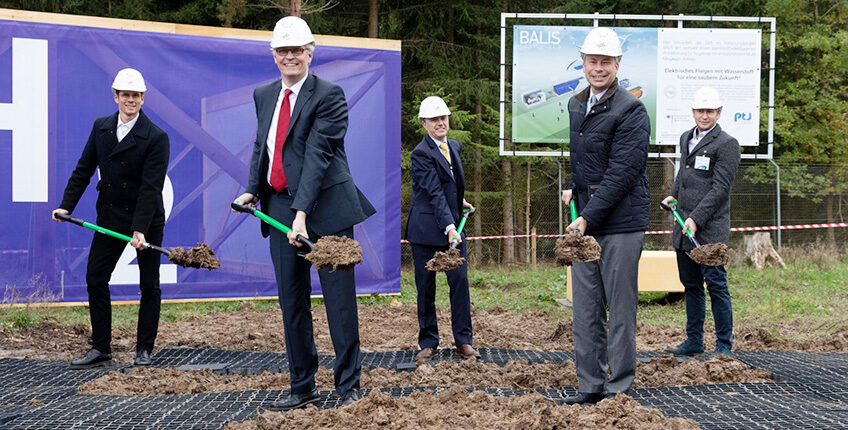DLR is establishing a unique test field in the BALIS project. It will be used to develop and test fuel cell drives for various modes of transport. The focus is on fuel cells with an output of around 1.5 megawatts.
A groundbreaking ceremony for the BALIS test field took place on 6 October 2021 at the Empfingen Innovation Campus, and commissioning is expected to begin in autumn 2022. Key areas of focus include: transport, aviation, energy, hydrogen, emission-free flying, fuel cell technology.
The German Aerospace Centre (DLR – Deutsches Zentrum für Luft- und Raumfahrt) is establishing a world-wide unique test field at the Empfingen Innovation Campus in the northern Black Forest to develop and test fuel cell drive systems for various modes of transport, including aircraft. The groundbreaking ceremony for the facility took place on 6 October 2021 together with various representatives from politics, public administration and industry.
New generation of fuel cell systems enable emission-free take-off
The BALIS project, for which the DLR Institute of Technical Thermodynamics is responsible, focuses on fuel cell systems with an output of around 1.5 megawatts. In the future, this could be used, for example, to build a regional aircraft with 40 to 60 seats and a range of 1,000 kilometres. The complex BALIS test infrastructure represents the necessary overall system, namely the complete hardware and the necessary infrastructure. This includes the fuel cell system itself, the hydrogen tanks, electric motors and the control and regulation technology. The test field will therefore facilitate research and development work under a wide variety of applicable framework conditions, requirements and guidelines. In addition to setting up and operating the test field, DLR is also developing and testing its own fuel cell system in the BALIS project.
“Today’s groundbreaking ceremony lays the foundation for a highly innovative test field that will allow the development of key components of zero-emission aviation. This makes BALIS a very special project and an important step towards commercial passenger aviation with hydrogen and fuel cells,” explained Steffen Bilger, Parliamentary State Secretary at the Federal Ministry of Transport and Digital Infrastructure.
“The fuel cell is an important technology to enable emission-free air travel. The BALIS test field creates a unique infrastructure to further develop aircraft with this technology,” stated Prof. Dr.-Ing. Karsten Lemmer, member of the DLR Executive Board and responsible for Innovation, Transfer and Scientific Infrastructures. “There is already a great deal of interest from industry and we are in dialogue with major aircraft manufacturers, start-ups and the producers of components in the field of fuel cells, electric motors, hydrogen tanks and power electronics for this very purpose.”
First research projects from 2023, testing of full drive systems from 2024/25 onwards
The test field is being constructed on an undeveloped area of around 2,000 square metres on the site of the Empfingen Innovation Campus. It is composed of seven specially designed and equipped laboratory containers. Commissioning of the research infrastructure is expected to begin in autumn 2022 and will require around nine months. According to current plans, parts of the facility, especially in the areas of fuel cells and electric motors, will be ready for use for initial research and development projects as early as the beginning of 2023. Testing of complete drives will be possible from 2024/2025. Approximately a handful of scientific and technical staff from the DLR Institute of Technical Thermodynamics will be constantly on site to set up and operate the facility.
“The Innovation Campus offers the best conditions for quickly implementing the facility and further developing the associated research topics. On top of that, there is also a generous amount of space, a good infrastructure that can be expanded, and easy access from the institute’s location in Stuttgart,” says Prof. Dr André Thess, Director of the DLR Institute of Technical Thermodynamics, summarising the factors for locating the test field in Empfingen. DLR is already represented on the Innovation Campus with the msquare spin-off as well as a research observatory, which is scheduled to open in spring 2022.
Funding and coordination of the BALIS project
The BALIS project is being funded by the Federal Ministry of Transport and Digital Infrastructure (BMVI) within the scope of the National Innovation Programme Hydrogen and Fuel Cell Technology (NIP) with 26 million euros, and is being coordinated by NOW and implemented by the Project Management Organisation Jülich (PtJ).



